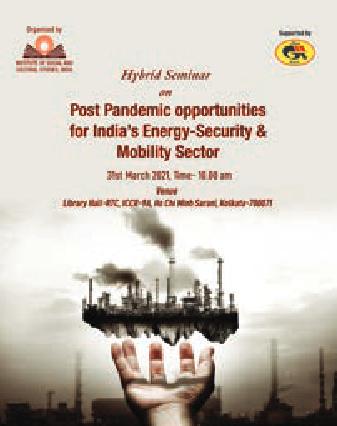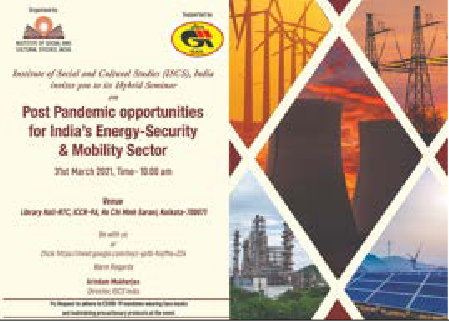Hybrid conference on Post Pandemic opportunities for India’s Energy- Security & Mobility Sector
- 31st March 2021
The Institute of Social and Cultural Studies(ISCS),India that as a part of its imperatives engages itself to identify and deliberate on concurrent happenings and multiple policy approachs. In support of Gail India, hosted a Hybrid Seminar on “Post Pandemic Opportunities for India’s Energy Security and Mobility Sector” .As an initiative to try and highlight factors that makes energy –security as a concept extremely complex. Secondly posts challenges towards establishing effective energy supply and security regime. Lastly over discussion with Distinguished Speakers and eminent academicians and researchers tried to address the quest for securing energy supplies collaging foreign security policies for the country to ensure a cantabile energy security frameworks post pandemic times.
The Hybrid seminar held on 31st March 2021 at the Library Hall, ICCR, Kolkata was marked with the inaugural address of Sri. Arindam Mukherjee, Director,ISCS, India .Who acknowledged that energy – security was a significant subject of academic deliberations and recognized as a corner stone of bilateral regional and global economic affairs of every nation. He stressed on the fact that energy –security issues played a strategic roles in ensuring country’s economic, development, prosperity, stability and well being of the people. India was one of the largest growing economies that had witnessed a gradual rise in consumption of energy. The first academic session on “Energy Security Conflict and Cooperation’s” started with the observation of the Chair – Vice Admiral Shekhar Sinha, who stated that energy is the core factor that has and continues to lead a conflict prone situations impeding life of the people and harmony among the neighbouring countries. He said that 45% of India’s energy resource is secured from coal, crude petroleum is 35%,natural gas is only 7%.
Thus stress should be laid on procuring energy from renewable resources. According to him energy is also important for the growth and development of manufacturing units that is directly proportional to the development of the nation. Thus security angles of the energy through policy approach should be emphasized ,though M a r i t i m e security is rested with incumbent to protect the energy resources of the country but a more comprehensive policy formats should be developed , NITI Ayog reports have mentioned about certain target based approach on which importance should be given.Ms. Swati Ganeshan- focussed on areas like impact of climate change on energy factor and ways to approach them in future, options and opportunities in the energy sector, and attempt to redefine energy security aspects and its future goals sustainably.Ms.Ganeshan added that rightfully and skilfully utilization of energy should be the priority along with usage of technology as the usage of fossil fuel cannot be brought down but could be replaced with technology ,more of dialogues and symposiums should be initiated with other countries to resolve energy-security oriented disputes and also in finding alternatives to reduce dependency on other countries for acquiring energy in future. Alternatives should be identified and used to reduce carbon emission through infrastructure, manufacturing units, transport sector.
Sri Pratim Ranjan Bose shred his views on the persistent arguments coal or nuclear and rested much weight on the utility of nuclear power. His deliberations over examples of incidences and happenings of country’s at various times laid impetus on building collaborations to resolve geopolitics, invite investments in the energy-security sector to boost the manufacturing units and stimulate the economy of the country. The second academic session on ““Attaining Sustainable Environment Through Energy Security” started with very interesting statement by the Chair of the session himself who stated that India is now in the best energy scenario and also in a much secured position. His focus remained on elucidating factors like availability, affordability and accessibility in case of energy-security. The Distinguished Speaker of the session Dr.Anindya Bhattacharya- regarded that in case of energy supply and demand goes hand in hand , we can only ensure that the country has a secured energy resource when the cycle of availability , accessibility and affordability is streamlined. On the other hand policies and lacuna in import regulatory policies, trading and usage of advanced technology should be mend to ensure sufficiency of energy and satisfactory energy security in coming times.
Like others the speaker emphasised on more dependability of renewable source of energy like solar, but underlined that in case of Solar , popper storage capacity is important thus importance should be laid on developing efficient storage capacity. According to Dr.Bhattacharya to conserve and make energy resource available and affordable to all Government should focus on factors associated with trade, consumer-producer prospective, rural demands, storage facility to overcome climate change and calamities, wealth management and multi-dimensional and multi-sectoral engagements. The session also facilitated a question answer and discussion session based on the utility of bio-gas and increased utility of other such renewable energy resources in future.







